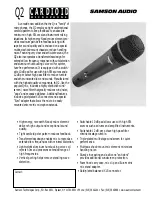
Type
Polar Pattern
Frequency Response
Sensitivity
Impedance
Max SPL
Equivalent Noise
Included Accessories
Dimensions
Weight
Distributed in Canada by:
Yorkville Sound Ltd
., 550 Granite Court, Pickering, Ontario L1W-3Y8
phone : (905) 837-8481 fax : (905) 839-5776
w w w . a p e x e l e c t r o n i c s . c o m
Dynamic
Cardioid
40Hz - 20kHz
14mv/Pa = -40dB (0dB = 1v/Pa)
-40dB
<250 Ohms
(For 1% THD @ 1000Hz)
142 dB
(IEC 268 - 4 - A weighted)
<17dB
Wood Carrying Case / MicStand Adaptor
3.5 x 3 x 2.2 in / 89 x 75 x 57mm
9.5 oz / 275g
Specifications:
Distributed in U.S.A. by:
Yorkville Sound Inc
., 4625 Witmer Industrial Estate Niagara Falls, New York, 14305
phone : (716) 297-2920 fax : (716) 297-3689
The Microphone
The Apex127 has been designed to be the ideal blues harp mic. The unique tapered shape allows the microphone to be cupped com-
fortably in the players' hand during live performance, while the polished all-metal shell protects the microphone capsule from sharp
impacts, even during the most enthusiastic of live performances.
The Apex127 is a true cardioid dynamic microphone. Unlike competitive 'closed back' harmonica mics, the Apex127's tight cardioid
polar pattern is most sensitive from the front face of the capsule, while effectively rejecting sound coming at the capsule from the sides
and back of the microphone.
The uniquely designed rear vented design of the Apex127 allows for more dramatic wah and flutter effects while enhancing the micro-
phone's feedback rejection characteristics, allowing for higher gain before feedback, and a hotter output level. This makes the Apex127
the perfect mic for the harp player who wants to overdrive the input of a tube guitar amp.
Although the cardioid pattern is usually the best design for live, high volume environments, please be aware that the mic's ability to
reject feedback will vary when the rear vents are covered.
The Apex127 is a true low impedance microphone, although it will, by design, function perfectly well when directly connected to a high
impedance input such as a guitar amp or used with an in-line volume pedal.
If the Apex127 is going to be used with exceptionally long cable runs, (directly connected to front-of-house
mixer for example) the balanced XLR microphone output can also be connected to any low impedance
microphone input on mixing console or mic preamp via standard high quality XLR to XLR microphone
cable. In extremely high gain systems, or when the Apex127 is used with lo-impedance volume pedals,
then an XLR to ¼-inch balancing transformer (such as the Apex AA14) may be used for best results.
Suggested Accessories
Apex AFP3
Volume Pedal
Apex AA14
XLR-F to 1/4-inch
low to high impedance line transformer
Apex127
Dynamic Cardioid Harmonica (Blues Harp) Microphone




















